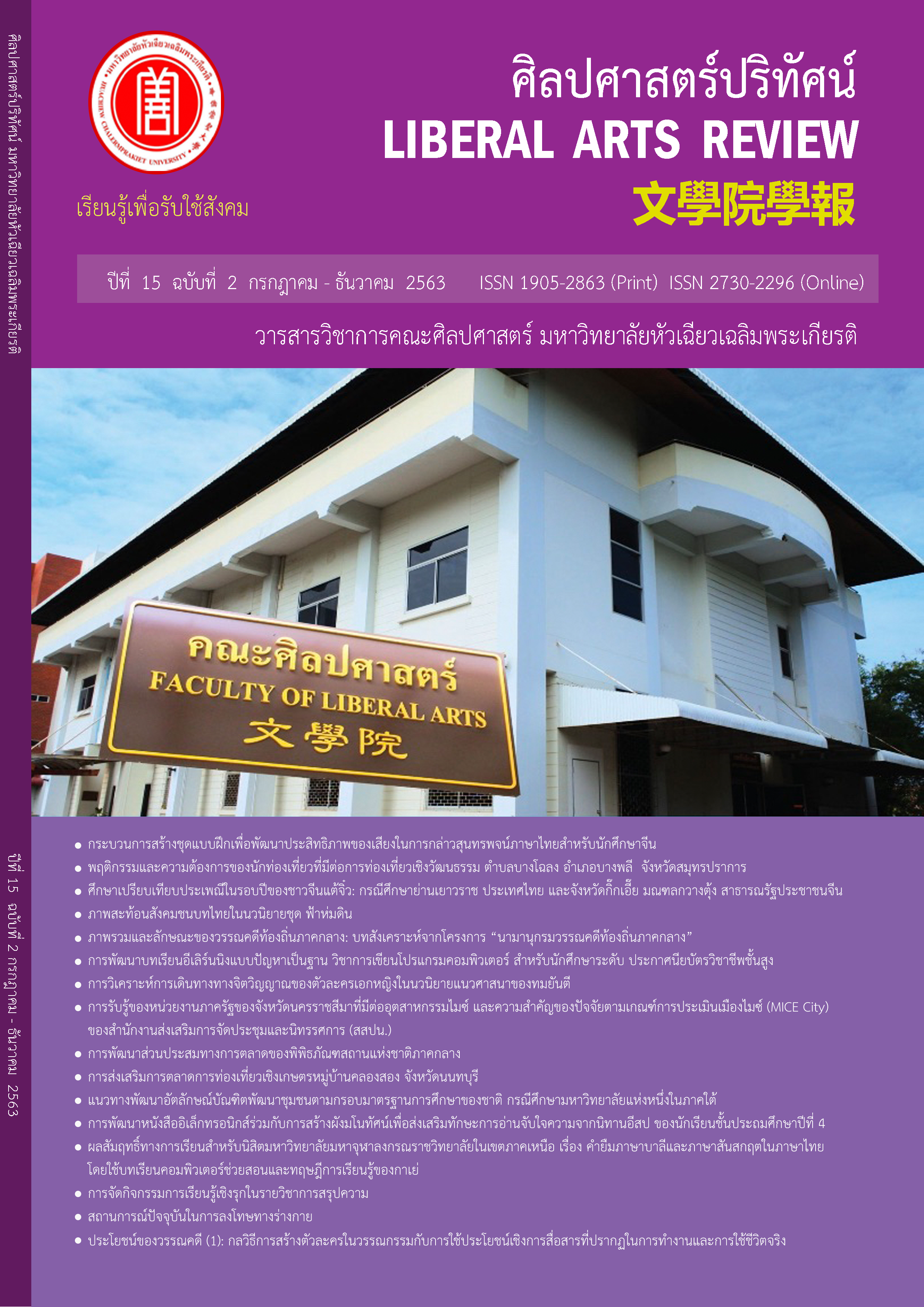Guidelines for the character of graduate of Community Development from the educational standard framework National, Case study a university in the southern region
Keywords:
Identity, Community Development Graduates, The National educational standard frameworkAbstract
This article aims to study: (1) the identity of community development graduates from the national educational standard framework and (2) identity improvement guidelines. The research was conducted using mixed methods; questionnaires were used to collect data from 31 graduates who are users, community developers and producers. The quantitative data were analyzed using means. Furthermore, qualitative data were collected from interviews and observation records from 20 graduates who are users, community developers and producers. The data were analyzed using descriptive analysis. The findings revealed as follows: the aspect of learners, innovators and citizens in all aspects was at a high level. The aspect with the highest mean was the citizens with high level, next is the learners with high level, and the innovators with high level as well. The guidelines for the identity of graduate of community development from the national educational standard framework:
(1) Learners focus on self-development training, and knowledge management (“lifelong learning").
(2) Innovation co-creator focus on problems awareness, systematic thinking, and be creative (“Think and create new knowledge”) (3) Active citizen focus on mutual understanding, accepting differences, and democracy (“different, but not split”) for the happiness of the community.
References
เดโช แขน้ำแก้ว. (2560). การพัฒนาตนในงานพัฒนาชุมชน. นครศรีธรรมราช: คณะมนุษยศาสตร์และสังคมศาสตร์ มหาวิทยาลัยราชภัฏนครศรีธรรมราช.
จันทร์ศรี สิมสินธุ์, ภูษิต บุญทองเถิง และ ทัศนีย์ นาคุณทรง. (2559). นวัตกรรมชุมชนเพื่อการเรียนรู้ตลอดชีวิต. วารสารบริหารการศึกษา มหาวิทยาลัยขอนแก่น, 12(1), 83-94.
ดนัย ปัตตพงศ์. (2558). เอกสารวิชาการด้านศาสตร์การวิจัย และสถิติประยุกต์. ค้นคืนจาก http://it.nation.ac.th/
faculty/danai/download/statistics%20talks7.pdf?fbclid=IwAR0MHhon.
นพชัย สิทธิ, เชษฐภูมิ วรรณไพศาล และ จารุณี มณีกุล. (2563). การจัดการเรียนรู้สาระท้องถิ่น เรื่อง แม่สอดศึกษาเพื่อส่งเสริมพลเมืองเข้มแข็งของนักเรียนชั้นประถมศึกษาปีที่ 6. วารสารศึกษาศาสตร์มหาวิทยาลัยนเรศวร, 22(1), 96-108.
พอพันธ์ สุทธิวัฒนะ และคณะ. (2562). การศึกษาระดับพัฒนาการของงผลการเรียนรู้ ตามกรอบมาตรฐานคุณวุฒิระดับอุดมศึกษาแห่งชาติ (TQF) โดยใช้รูปแบบการสอนในกลุ่มวิชาที่เน้นการบรรยายของนักศึกษาระดับปริญญาตรี มหาวิทยาลัยราชภัฏรําไพพรรณี. วารสารมนุษยศาสตร์และสังคมศาสตร์ มหาวิทยาลัยราชภัฏอุบลราชธานี, 10(2), 295-304.
รุจโรจน์ แก้วอุไร และ ชโรชีนีย์ ชัยมินทร์. (2562). พื้นที่การเรียนรู้สำหรับผู้เรียนยุคดิจิทัลในห้องสมุดสถาบัน
อุดมศึกษา. วารสารศึกษาศาสตร์ มหาวิทยาลัยนเรศวร, 21(4), 366-378.
วัฒนชัย ศิริญาณ และ ชัยรัตน์ มาสอน. (2561). การพัฒนาพลเมืองตามระบอบประชาธิปไตยในศตวรรษที่ 21. มนุษย์สังคม (มมส.), 16(1), 155-182.
วิไลพรรณ ตาริชกุล และ เกรียงไกรยศ พันธุ์ไทย. (2560). กระบวนการจัดการความรู้ เพื่อสร้างองค์การนวัตกรรม. วารสารวิชาการ มหาวิทยาลัยราชภัฏพระนคร, 8(2), 271-279.
สำนักงานเลขาธิการสภาการศึกษา กระทรวงศึกษาธิการ. (2561). มาตรฐานการศึกษาของชาติ พ.ศ. 2561. กรุงเทพมหานคร : กลุ่มมาตรฐานการศึกษา สำนักมาตรฐานการศึกษาและพัฒนาการเรียนรู้ สำนักงานเลขาธิการสภาการศึกษา กระทรวงศึกษาธิการ.
สุธิดา ทองคำ และคณะ. (2562). คุณลักษณะบัณฑิตที่พึงประสงค์ของนักศึกษาครุศาสตร์สาขาวิชาวิทยาศาสตร์และคณิตศาสตร์ในมหาวิทยาลัยราชภัฎ. ค้นคืนจาก https://app.gs.kku.ac.th/images/img/support/
grc2020/pdfpresent//HDO1.pdf.
อับดุลเลาะ เจ๊ะหลง และ จิรัชยา เจียวก๊ก. (2563). การถอดบทเรียนเพื่อการเรียนรู้ตลอดชีวิตในมนุษย์. วารสารบัณฑิตศึกษามหาวิทยาลัยราชภัฏวไลยอลงกรณ์ ในพระบรมราชูปถัมภ์, 14(2), 241-250.
Boonmak, S., et al. (2017). Research Methodology in Social Sciences. Songkhla : Faculty of Humanities and Social Sciences, Thaksin University.
Department Executive director of Community Development. (2017). Bachelor of Arts Program in The Community Development at 2017. Nakhon Si Thammarat: Faculty of Humanities and Social Sciences.
Makmee, P. (2016). Research Design for Mixed Method Research. Journal of the Association of Researchers, 21(2), 19-31.
Office of Academic Promotion and Registration. (2018). Report the number of students registering and student status. Nakhon Si Thammarat: Office of Academic Promotion and Registration.
Phumkokrux, S., et al. (2016). Desired Characteristics of Graduates from Faculty of Nursing, Chiang Mai University as Perceived by their Supervisors/ Employers. Nursing Journal, 43 (Special), 151-161.
Sangsakun, P. (2016). Desirable characteristics of local leaders in Thung Lan Subdistrict Municipality, Khlong Hoi Khong District, Songkhla Province. Journal of Education Thaksin University, 16(1), 144-152.
Thongkhamphan, C., Kritsanaphuti, W., & Kaowkahan, L. (2018). Opinions towards Identity of Public Administration Graduate of North Eastern University, KhonKaen Province. UMT-POLY Journal, 15(2), 97-110.
University in the southern region. (2015). Philosophy Vision and Mission. Retrieved from https://www.nstru.ac.th/en/page/history.
Downloads
Published
How to Cite
Issue
Section
License
บทความที่ได้รับการตีพิมพ์เป็นลิขสิทธิ์ของวารสารศิลปศาสตร์วิชาการและวิจัย
ข้อความที่ปรากฏในบทความแต่ละเรื่องในวารสารวิชาการเล่มนี้เป็นความคิดเห็นส่วนตัวของผู้เขียนแต่ละท่านไม่เกี่ยวข้องกับมหาวิทยาลัยหัวเฉียวเฉลิมพระเกียรติ และคณาจารย์ท่านอื่นๆ ในมหาวิทยาลัยฯ แต่อย่างใด ความรับผิดชอบองค์ประกอบทั้งหมดของบทความแต่ละเรื่องเป็นของผู้เขียนแต่ละท่าน หากมีความผิดพลาดใดๆ ผู้เขียนแต่ละท่านจะรับผิดชอบบทความของตนเองแต่ผู้เดียว




